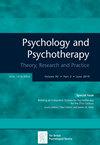Changes in the predictive effects of family function and depressive symptoms of suicide-related behaviours in Chinese adolescents during COVID-19
Abstract
Background
The COVID-19 pandemic has led to a global mental health crisis, with increased rates of depression among adolescents, exacerbated by interventions such as social distancing and school closures. While widespread anti-epidemic experiences may have strengthened social cohesion and improved adolescents' mental health, the long-term impact of the pandemic on mental health remains a concern, particularly regarding suicide-related behaviours.
Method
This study explored changes in suicide-related behaviours among adolescents with depressive symptoms during the pandemic. A cohort of 4245 students aged 10–19 participated in a school-based survey in 2020, followed by a follow-up in 2021. Cross-lagged panel analysis was used to examine associations between depressive symptoms, suicide-related behaviours and family functioning over time.
Results
Depressive symptoms increased from 2020 to 2021, with a significant rise in mild symptoms (95% CI: 15.53%, 17.78%), whereas severe symptoms decreased (95% CI: 10.24%, 12.14%) (p < .05). Suicide-related behaviours, except suicidal plans, showed a decreasing trend (p < .05). Significant correlations were found between family functioning, depressive symptoms and suicide-related behaviours.
Conclusions
While some aspects of adolescent mental health, such as depressive symptoms, showed improvement during the pandemic, depressive symptoms remained a strong predictor of suicide-related behaviours. The findings underscore the importance of addressing depressive symptoms as a key risk factor for suicide and highlight the role of family functioning in mitigating these risks. Continued attention to adolescent mental health, especially in the context of prolonged pandemic-related stressors, is essential.




 求助内容:
求助内容: 应助结果提醒方式:
应助结果提醒方式:


